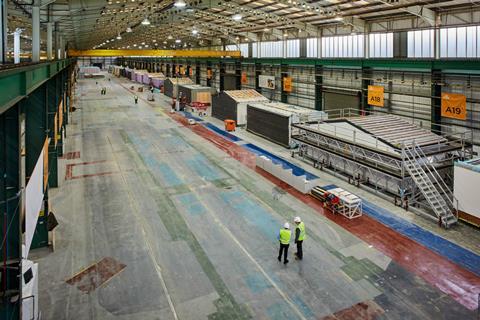Housing Forum urges public sector to embrace new technologies

Modern methods of construction offer affordable housebuilders an ideal way to boost supply, according to a new guide.
The guide, “MMC for affordable housing developers”, spells out the rationale for using new technologies in affordable housing supply and according to Housing Forum chief executive Shelagh Grant “challenges the myths surrounding procurement, contracts, difficulty in securing finance and confusion over contracts”.
As well as highlighting faster build times and the reduction of defects the guide said MMC could offer “more predictable thermal performance, improved cashflow and a reduction in the building’s maintenance costs”.
Key drivers for the adoption of MMC – political and regulatory, economic and social pressures and advances in technology – had converged in recent years and now made MMC “a feasible, attractive and efficient option for the residential sector”, the guide went on.
Yet the document also acknowledged the barriers facing greater uptake of MMC. Compliance with the procurement regime was identified as one of the biggest issues preventing public sector organisations from adopting MMC.
Other sections within the guide include information on how to select the right form of MMC for a project, ranging from finding the right design team to achieving a successful design, tips on how to explain the project to key stakeholders such as clients and planners and a checklist on what to look out for in the planning and design stages.
Grant said: “MMC will help the government meet its commitment to deliver 300,000 homes a year, but also benefit affordable housing providers and its tenants. Using MMC effectively will future-proof housing supply.”
Key drivers for MMC
Political and regulatory
• A greater onus on building safety and accountability in the new regulatory regime being introduced by government following the review from Dame Judith Hackitt of the Grenfell fire: MMC can provide both
• Government’s commitment to 300,000 homes a year: MMC offers speed and efficiency in a time of labour shortages
• Renewed political focus on the quality of new build homes following an outcry from the public and MPs about shoddy workmanship: quality and precision can be higher in factory-built homes.
Economic and social pressures
• The need for greater productivity in construction
• An ageing, shrinking construction workforce, exacerbated by the impact of Brexit and the drift to other markets of labour from Eastern Europe
• The arrival of new institutional investor entrants into the residential market who are typically private landlords in the sector for the long term, looking to build out developments in single phases, rather than phased over time. This trend plays to the strengths of MMC.
Technological advances
• Advances in digital technologies, such as building information modelling (BIM), are delivering increasing efficiency and flexibility, creating manufacturing blueprints from architects’ designs.
Source: MMC for affordable housing devleopers











No comments yet